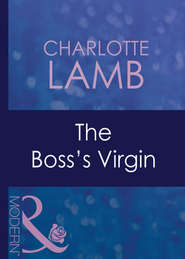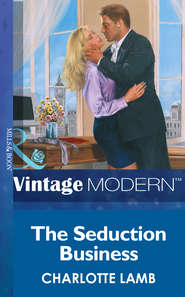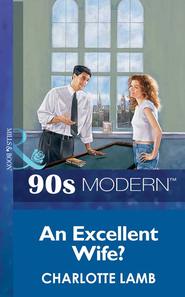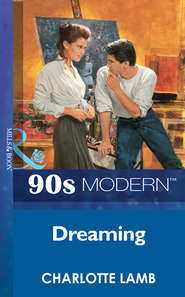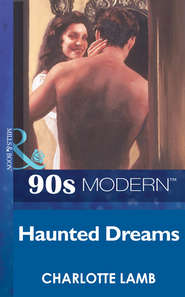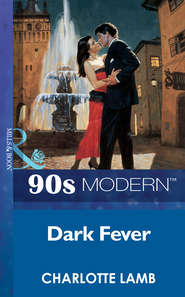По всем вопросам обращайтесь на: info@litportal.ru
(©) 2003-2025.
✖
The Marriage War
Автор
Год написания книги
2018
Настройки чтения
Размер шрифта
Высота строк
Поля
Flora had taken the opportunity of her mother’s absent-mindedness to sneak off into the garden, her eyes set on the yellow tulips edging the lawn.
‘No, you don’t,’ Sancha said, pursuing her. ‘We’ll go for a walk when I’ve done all my jobs.’ She picked her up, took another long look at the morning radiance of the garden and went back indoors, closing the door with one foot.
Her routine was the same every day. She worked in the kitchen first—cleared the table, piled dirty dishes into the washing-up machine and switched it on, sorted out the day’s washing and put that into the washing machine to soak for half an hour—then carried Flora upstairs and dumped her into her cot while Sancha had a quick shower, herself, then dressed in jeans and an old blue shirt.
It was an hour later, when she had finished vacuum cleaning the sitting-room and hall, that she remembered the letter and went to the kitchen to find it. She made herself a cup of coffee, gave Flora a piece of apple to eat in her playpen, and opened the envelope. The letter was typed and unsigned. It wasn’t very long; she read it almost in a glance, her ears deafened with the rapid bloodbeat of fear and jealousy.
Do you know where your husband will be tonight? Do you know who he’ll be with? Her name is Jacqui Farrar, she’s his assistant, and she has an apartment in the Crown Tower in Alamo Street. Number 8 on the second floor. They’ve been having an affair for weeks.
Sancha’s heart lurched. She put a hand up to her mouth to stop a cry of shock escaping, caught the edge of her cup and knocked over her coffee. The hot black liquid splashed down her shirt, soaked through the legs of her jeans. She leapt up, sobbing, swearing.
‘Naughty Mummy,’ Flora scolded, looking pleasantly scandalised. Primly she added, ‘Bad word. Bad Mummy.’
Sancha said it again furiously, looking for kitchen roll to do more of her habitual mopping up—only this time it was she who had made the mess, not Flora.
It can’t be true, she thought; he wouldn’t. Mark wouldn’t have an affair. She would have known; she would have noticed.
Or would she? Yes! she thought defiantly, refusing to admit that her stomach was cramped with fear. He was her husband; she knew him. He loved her; he wouldn’t get involved with anyone else.
But did he still love her? She remembered the distaste in his face that morning, over breakfast, and bit her lower lip. Mark no longer looked at her the way he used to; she couldn’t deny that. Somehow, without her noticing it, love and passion had seeped out of their relationship, but that didn’t mean there was anyone else. She couldn’t believe he would be unfaithful to her. Not Mark. He wouldn’t.
She had never met his assistant, although she knew the name. Jacqui Farrar had joined the firm only six months ago, from another civil engineering company. Mark had mentioned her a few times at first, but not lately.
Sancha had no idea what she looked like, even how old she was. It had never entered her head that there could be anything going on between her and Mark.
Of course there isn’t! she told herself. Don’t even think about it. Whoever had written that letter was crazy.
Sancha ran an angry hand over her tearstained face and then picked up Flora. At the moment they could never be apart, they were handcuffed together for all Flora’s waking hours—she could not be left alone for a second or she got into some sort of mischief.
Sancha often felt exhausted by the sheer, unrelenting nature of motherhood, longing for a few hours alone, a day when she did not have to think about other people all the time, when she could be lazy, sleep late, get up whenever she pleased or put on something more elegant than jeans, wear high heels, have her hair done, buy expensive make-up, shower herself with delicious French perfume—anything to feel like a woman rather than a mother.
But it was what she and Mark had wanted when they got married. They had talked about it from the start, in perfect accord in both longing for children. Mark had been an only child of older parents. His mother had been over forty when he was born, his father even older than that. Mark had had a lonely childhood and dreamt of having a brother or sister. His parents had died before he met Sancha; she’d never known them, but she had realised Mark’s deep need to be part of a family at last. Sancha had been broody, too, had ached to have a baby, had seen herself as some sort of Mother Earth, creating this wonderful, close, warm family life, without any idea of how much work and sacrifice on her part would be involved.
Sighing, she popped Flora back into her cot, gave her a handful of toys to play with, then had another hurried shower and changed into clean jeans, a clean shirt. She stood in front of the dressing-table and studied herself bleakly. What did she look like? What on earth did she look like? A hag, she thought. I’m turning into a positive hag. No wonder Mark had given her a disgusted look this morning. She couldn’t blame him. How long was it since she’d even thought about the way she looked?
Or had the energy to try to seduce Mark in bed, the way she once had, years ago, when they were first married? Once upon a time she would slide into bed naked and tease him with stroking fingers and soft, light kisses, but hold him off as long as possible, arouse him to a point of frenzy before she let him take her. They had been passionate lovers, hadn’t they?
Biting her lip, she tried to remember when they had last made love, but couldn’t. It must be weeks. A dull, cynical voice whispered to her. Months! It was months!
Since Flora’s birth they had made love less and less often, and at first it had been she who had never felt like it. Mark had been gentle, sympathetic, understanding; he hadn’t got angry or complained. She had had three babies in six years; it wasn’t surprising that she was so tired and listless.
They hadn’t planned to have more than two children. Flora had been an accident, and that last pregnancy had been the worst. Sancha had had morning sickness, backache, cramp in her legs, restless nights—and even when she had had the baby she’d felt no better. She’d been too exhausted after being in labour for two days, in great pain much of the time. Afterwards she had kept crying; the changes in her hormones during and after her pregnancy had left her in emotional turmoil. A fit of the blues, her sister, Zoe, had called it. Her doctor had called it depression, but all Sancha knew was that the smallest thing could set her off on a crying jag and nothing seemed to help.
It hadn’t lasted very long—a month or two, three at the most—but Flora, from the first moment of her arrival in the world, had been difficult; a restless, crying baby at night and in the daytime needing permanent attention.
Sancha had never really got back her energy, her enjoyment of life, her desire to make love. What energy she did have went into Flora and into her daily routine—the two boys, the house, the garden. Only now did she realise how little time she had spent alone with Mark over the past couple of years.
It had happened so gradually that she hadn’t understood until now that they were drifting apart, inch by inch, hour by hour.
The jangle of the front doorbell made her jump. Who on earth could that be? She collected Flora and carried her back downstairs.
She was startled, and a little embarrassed, to find her sister standing on the doorstep. ‘Oh, hello, Zoe,’ she murmured, rather huskily. ‘I thought you were filming in the Lake District this week?’
‘We finished there yesterday so I drove back last night. I told you we were all going to be filming on location around here, didn’t I? I’ve got a few days off before we start,’ Zoe said, eying her shrewdly. ‘Your eyes are pink—have you been crying?’
‘No,’ lied Sancha, wishing her sister was not so observant, did not see so much. Zoe had always been far too sharp and quick.
‘Mummy swore,’ Flora informed her aunt. ‘Bad Mummy.’
‘Bad Mummy,’ agreed Zoe, watching Sancha. ‘Who were you swearing at? The little love-bug, here? Having a bad day with her, or is something wrong?’
‘I knocked my coffee over, that’s all—no big deal,’ Sancha said, but didn’t meet her sister’s thoughtful stare.
‘Hmm.’ Zoe grinned at Flora. ‘Was it you who knocked Mummy’s coffee over? I bet it was. Come to Auntie Zoe?’
Flora went willingly, and at once began to investigate the dangling, sparkly earrings Zoe was wearing.
‘Hands off, monster,’ Zoe told her, pushing her small pink hands down. ‘Into everything, aren’t you? Boy, am I glad I don’t have any kids.’
‘Time you had some,’ Sancha said, getting a sardonic look from Zoe.
‘Says who? You’re no advertisement for the maternal state. Every time I see you, you look worse. How about a cup of coffee, or are you too busy?’
‘Of course I’m not.’ Sancha walked through into the kitchen and Zoe followed her. She was wearing what she no doubt thought of as ‘casual’ clothes—elegant, tight-fitting black leather trousers, a vivid emerald silk top. Sancha inspected them with envy. They were probably designer clothes, their cut was so good; they had ‘chic’ written all over them and had undoubtedly cost an arm and a leg.
She couldn’t afford clothes like that—and even if she could she would never be able to wear them. Flora would ruin them in no time, would spill food on them, crayon all over them or be sick on them. Flora had a dozen charming ways of ruining clothes, and all without really trying. You couldn’t accuse her of doing it deliberately.
They wouldn’t look that good on Sancha, anyway. Zoe, however, was dazzling whatever she wore—a tall woman, already thirty-two, with flame-red hair and cat-like green eyes, beautiful, sophisticated, clever, talented and highly paid. She worked for a TV production company, and was currently making a four-part series of a bestseller novel with household names in the starring roles.
She had a small cottage outside town, but was barely there because her work took her all over the world. You never knew where she would be filming next. Last year she had worked on films in Spain and California. So far this year all her work had been back home, in the United Kingdom.
The sisters had always been very close, and since Sancha had got married they still saw a good deal of each other; Zoe was Sancha’s closest friend, although their lives were so different.
Zoe’s private life was usually as busy as her career. Sancha could not keep up with the men Zoe dated, often very starry, famous men, but none of them had ever been important enough for Zoe to introduce them to her sister, or her parents, which meant she’d never considered marrying them, or even setting up house with them. The only thing that mattered to Zoe seemed to be her career.
Before she’d met Mark, Sancha had been set on a career, too, but in photography, not films. She had been working for a top Bond Street photographer, specialising in the fashion business, and had had her eyes set on the heights. One day she’d meant to have her own salon, make her name world-famous. She had had dreams.
Mark’s arrival in her life had changed all that. One minute she was focused entirely on her work—the next it didn’t matter a damn to her. Only Mark mattered. She forgot everything but being with him, loving him, going to bed with him. He ate up her entire life.
Zoe had had very few problems in climbing to the top; her abilities were too outstanding and her personality too powerful. Sancha had grown up in her shadow, knowing she was not as beautiful or as brilliant. She might have been overshadowed by Zoe, lost confidence in herself—instead she had competed with her, in a perfectly cheerful way, had been determined to be as successful as her older sister, make her own name, become famous.
The competition between them had ended when Sancha got married and had children. She no longer cared about success, about beating Zoe; she was too happy to think about a career any more. In fact, the only time she touched a camera lately was to take pictures of her children.
Putting Flora into her highchair, Zoe opened the fridge and found some orange juice, poured a little into a mug and gave it to her, then sat down at the pine table, keeping a safe distance from her little niece and the possibility of getting splashed with juice.
Sancha made coffee, keeping her back to Zoe. ‘How’s the filming going? Smoothly, or are there problems?’
‘Only one problem—the casting director insisted on picking Hal Thaxford.’ Zoe’s dry voice made Sancha smile. She had heard her sister’s views on Hal Thaxford before.






